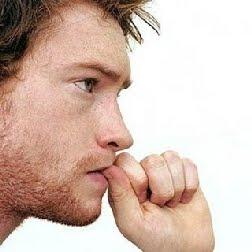
C'è chi strizza l'occhio, chi si schiarisce continuamente la voce, oppure si mordicchia il labbro o si tocca il lobo di un orecchio o il naso. Sono piccoli gesti dei quali perdiamo il controllo quando siamo nervosi, in una parola sono tic. Da semplici atteggiamenti ripetitivi e incontrollati possono diventare smorfie o gesti imbarazzanti, che al limite condizionano la vita. I "ticcosi" sono un piccolo esercito: anche se non esiste un "registro" del disturbo, si calcola che ne sia colpito circa un milione di persone, tra cui il 20% dei ragazzini.
Ma come vivono gli italiani con un tic? "Ci sono azioni buffe o divertenti, come quelle di chi tende, sotto stress, a infilarsi le dita nel naso - testimonia Porta - altre imbarazzanti, come il caso di un uomo che si tirava giù i pantaloni in pubblico. Ma anche casi drammatici, come quello di un bambino che si titillava la gola con le posate rischiando di farsi davvero male, o di uomo che, a furia di battere la testa all'indietro, è diventato tetraparetico". Come affrontare il problema? "Prima di tutto bisogna capire se esiste un disagio sociale, che va curato. Inoltre, in alcuni casi, si può insegnare al ticcoso a camuffare il tic: ad esempio, se ho l'abitudine di schiarirmi continuamente la voce, posso preparare il mio interlocutore dicendogli che soffro di faringite.
Si tratta di strategie valide per i tic più leggeri", avverte l'esperto. Nei casi più gravi esistono farmaci, costosi e non approvati però in Italia.
foto Dal Web
Sono proprio i più giovani, ossia i bambini delle elementari e delle medie, tra gli 8 ai 15 anni, i più colpiti da questa abitudine. A disegnare l'identikit degli italiani alle prese con un tic è Mauro Porta, direttore del Centro Tourette e Parkinson dell'Irccs Galeazzi di Milano.
Spiega l'esperto: "In generale gli uomini sono più spesso vittime di tic, e il problema si manifesta nell'infanzia, con quadri che tendono a scemare nell'età adulta, intorno ai 24-25 anni". Un universo di cui fanno parte i pazienti con sindrome di Tourette, una malattia che si manifesta proprio con l'insorgenza di questi gesti incontrollati, che ha carattere neurologico con basi genetiche e che colpisce circa 400mila italiani. Il disturbo è noto anche come "sindrome di Mozart", visto che il genio della musica è uno dei pazienti più celebri – ed è caratterizzata da movimenti involontari del corpo o facciali, e tic di tipo vocale o verbale: si va dalla ripetizione di una parola fino all'incontrollabile ricorso a parole o espressioni imbarazzanti o volgari.
Per lo più il tic passa inosservato. quando però provoca un disagio sociale o espone a rischi i pazienti, bisogna correre ai ripari. Ad esempio, dice l'esperto, se il mio tic prevede una pulizia continua degli occhiali, non c'è nessun problema. Diverso è il discorso se sono spinto a farlo mentre guido l'auto. A innescare il tic possono essere problemi organici o di origine psicogena, scatenati da stress ed emotività. "Inoltre è noto che anche l'abuso di sostanze e di alcolici può essere all'origine del problema: eroina e cocaina sono sostanze ticcogene".
Per qualche motivo, le donne sembrano meno soggette al problema. "Forse perché nell'uomo prevale l'impiego dell'emisfero destro del cervello, quello che permette di trovare soluzioni rapidamente senza vagliare attentamente tutti i dati, affidandosi alla creatività. Mentre la donna è più analitica", ipotizza l'esperto.
E voi con i vostri "tic" come ve la cavate ?
Buona Giornata
Roberto
There are those who winks, who constantly clears his voice, or biting the lip or touching the lobe of an ear or nose. These are small gestures of which we lose control when we are nervous, in a word are tics. From simple repetitive behavior can become uncontrolled and embarrassing grimaces or gestures, that affect the lives on the edge. I "ticcosi" are a small army, even if there is a "register" of the disorder, it is estimated that it has hit a million people, including 20% of boys.
But how Italians live with a twitch? "There are funny or fun activities, such as those who tend, under stress, to put his fingers in the nose - is testament to door - other embarrassing, as the case of a man who pulled down his pants in public. But even dramatic cases, like a child who is titillated by the throat with the cutlery in danger of being really bad, or man who, by dint of beating his head, became tetraparetico. How to tackle the problem? "First you need to understand if there is a social disease, which is nice. Furthermore, in some cases, you can teach ticcoso to disguise the tic: for example, if I have the habit of constantly clear my voice, I can prepare my interlocutor told him that I suffer from sore throat.
These are good strategies for tick lighter, "warns the expert. In severe cases, there are drugs, however, expensive and not approved in Italy.
Photos from the Web
They are just younger people, namely children of elementary and middle, between 8 and 15 years, the most affected by this habit. To draw the identikit of the Italians struggling with a tic is Mauro Porta, Director of the Tourette's and Parkinson IRCCS Galeazzi, Milan.
The expert explains: "In general, men are more often victims of tics, and the problem manifests itself in childhood, with pictures that tend to diminish in adulthood, around 24-25 years." A universe which includes patients with Tourette's syndrome, a disease that is manifested with the onset of these uncontrolled movements, which provides both genetic and neurological bases that affects about 400 thousand Italians. The disorder is also known as "Mozart's syndrome", as the musical genius is one of the most famous patients - and is characterized by involuntary body movements or facial tics and type of vocal or verbal, ranging from the repetition of a until word of the uncontrolled use of words or embarrassing or vulgar expressions.
For the most part the tick goes unnoticed. but when they cause discomfort or social risks in patients, we must run for cover. For example, the expert said, if my tics provides continuous cleaning of the glasses, there is no problem. Is a different matter if they are forced to do so while driving a car. A tic can trigger problems for organic or psychogenic origin, triggered by stress and emotion. "It is also known that substance abuse and alcohol may be causing the problem: heroin and cocaine are ticcogene substances."
For some reason, women seem less prone to the problem. "Perhaps because humans prevalent use of the right hemisphere of the brain, that allows you to find solutions quickly without carefully consider all the data, relying on creativity. While she is more analytical," the expert suggests.
And you with your "tic" how you dug?
Have a nice Day
Roberto




